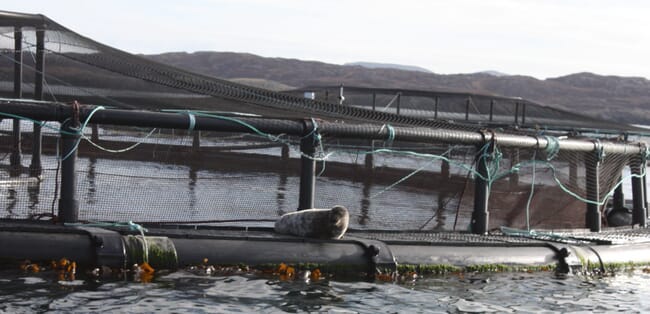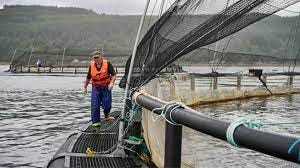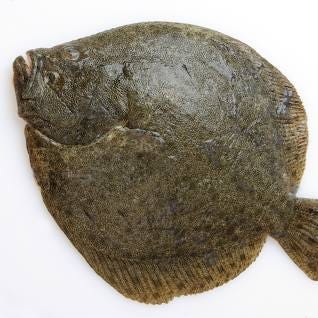Björk, the extraordinary cross-genre artist, has collaborated with Spanish singer-songwriter Rosalía on a new single, her first since her 2022 album, to raise money for a fight against fish farming in Iceland. If you want an early listen to a snatch of the not yet named song, to be released sometime this month, which repeats, “Is that the right thing to do?”, click below:
The story behind it is that Björk, a long-time campaigner on environment issues and supporter of Greta Thunberg, who launched a foundation in 2008 to protect the natural environment of Iceland, is deeply concerned about conditions in Iceland’s fish farms and the safety of Iceland’s wild salmon. Last year, in a merger worth £118 million/$98.40 million, two of the country’s biggest fisheries joined to form Ice Fish Farms. It now controls four of Iceland’s fjords and aims to process 10 million farmed salmon each year.
Almost half the fish consumed world-wide each year is farmed. My rant on the subject is at What annoys a noisy oyster. The trouble is, farmed salmon, which can carry sea lice despite being regularly dosed with antibiotics (organic farmed fish, too), have been escaping and breeding with wild salmon. This changes their DNA and, as Björk worries, will eventually wipe out the wild salmon for which Iceland is justly famous.
Scotland has a similar problem so is equally concerned. As is Norway. The Norwegian fish farming industry is expanding at a rate of knots. The industry is obliged by law to report escapes. Between 2010 and 2018, 1,960,000 Atlantic salmon and rainbow trout were registered by the Norwegian Directorate of Fisheries as having escaped from Norwegian fish farms.
The situation in the US is no different. In Maine this August, Cooke Aquaculture reported the loss of around 50,000 juvenile salmon from two of its net pens, blaming an attack by seals as the likely cause.
Escapes of Atlantic salmon from farms along the west coasts of the US and Canada occur on a regular basis. Farmed Atlantic salmon have been found thousands of miles away from the nearest salmon farms, even in the Pacific Ocean, and breeding near aquaculture operations down in South America as well as far north, in British Columbia.
A decade ago, the non-profit Oceana, which campaigns to protect and restore the world’s oceans, reported more than 10 million salmon were estimated to escape each year.
Not only are escaping fish travelling great distances, but they are a threat to the long-term health and fitness of native fish populations in every ocean. On December 31, 2008, following violent storms in southern Chile, 750,000 salmon and trout escaped from fish farms. Some of the salmon carried the ISA virus, infectious salmon anaemia, probably infecting nearby fish farms. With climate change, such violent storms have been on the increase.
Mowi is the world's leading seafood company, recording in just the second quarter of 2023 an all-time high revenue of 1,365 million euros/$1,434 million. In August 2020, its salmon fish farm at North Carradale off the West Coast of Scotland shifted position after Storm Ellen dislodged its seabed anchors. Four of its pens were damaged, the netting on two of them torn. Mowi numbered 48,834 out of the farm’s total of 550,000 farmed fish as escaped into the wild waters.
While the 3-D printed fish I wrote about in Fish for supper? Print it out may not be your first choice with chips, they could become the best solution - for the health of the sea and its remaining fish populations. The irony about a farmed fish is that to produce 1 kilo/2.2 lbs of farmed fish, 2.4 kilos/5¼ lbs of wild fish is required as feed, though not all of these are types consumed by us.
My father inadvertently practised sustainable fishing. He spent all day in the waters of the River Test peacefully away from his raucous family, contentedly fishing for trout, salmon and grayling. He never caught a thing but to convince us he had spent his day usefully, he stopped on his way home at the fishmonger. We never suspected, celebrating our father-fished suppers - till the day he returned with a large sea bream, not to be found in the chalk river.
Your best bet if you're going to eat fish is to buy line-caught and hope the fish is a wild one.
Aim for a turbot, a flatfish known as the king of the sea (are turbot only male?) for its superiority of flavour and texture, and you are less likely to be sold a farmed fish, although they are farmed in Spain. Its thick, meaty and rich flesh makes it a favourite among chefs, since it can be poached, baked, roasted, grilled, and sauteed in butter, to great effect with each method. It is an expensive fish, so one for a celebration. But it’s such an easy fish to cook, it’s worth pushing the boat out. (Sorry.) If you’re at the seaside, you are likely to find it sold more reasonably priced at local fishmongers. The turbot sold in the US is generally wild-caught turbot from Greenland. Where it is farmed, it tends to be sustainably and responsibly managed and harvested under US regulations.
Preheat the oven to 160C/350F. Just finely slice the well-washed white parts of several leeks (it depends on how large is your turbot. What you want is a generous bed of leeks) and saute them gently in butter until soft. Spread the leeks on a sheet of aluminium foil large enough to fold over and seal the fish. Lightly slash the fish across, not too deep, 3-4 times to help the fish cook through. Lay the fish on top of the leeks with a few thin slices on top of the turbot, then slosh a small glass of white wine over the fish. Season with salt and freshly ground black pepper then seal the package tightly. Bake for 35-40 minutes then check to see, at one of your slashes, if the fish is coming away from the bone. If it’s only a couple of minutes from being fully cooked, don’t return it to the oven. Let it rest on the side where it will complete the cooking in its own heat. You can serve this as it is with steamed potatoes and tenderstem broccoli on the side, with lemons to squeeze over. Or you can turn it into a superstar with a beurre blanc sauce.
You can improvise: lay the fish on a bed of caramelised lemon slices, on slices of par-boiled potatoes and steamed fennel, drizzling a generous amount of olive oil over and not sealing the package but roasting the fish open.
Don’t ditch the bones. Put them in a large pot and cover them with water. They contain gelatine to make the most wonderfully rich fish stock. And stink your kitchen out.








Dawn Sarin has sent me this excellent long read of hers: https://online.ucpress.edu/gastronomica/article/22/4/20/194513/Pirogues-to-Paradise. Read it for this reason she cites:"the next time you read about an influx of immigrants from West Africa and wonder why so many people are leaving their communities, their friends, and their families, taking ill-equipped pirogues over choppy seas, willing to come face to face with dehydration, despair, and a watery grave, you might want to consider what is on your own plate. If your meal consists of West African fish, or farmed fish fed on fish meal from West African coasts, you may be part of the present problem."
I have! And posted the link. Thank you for thinking of Tabled!